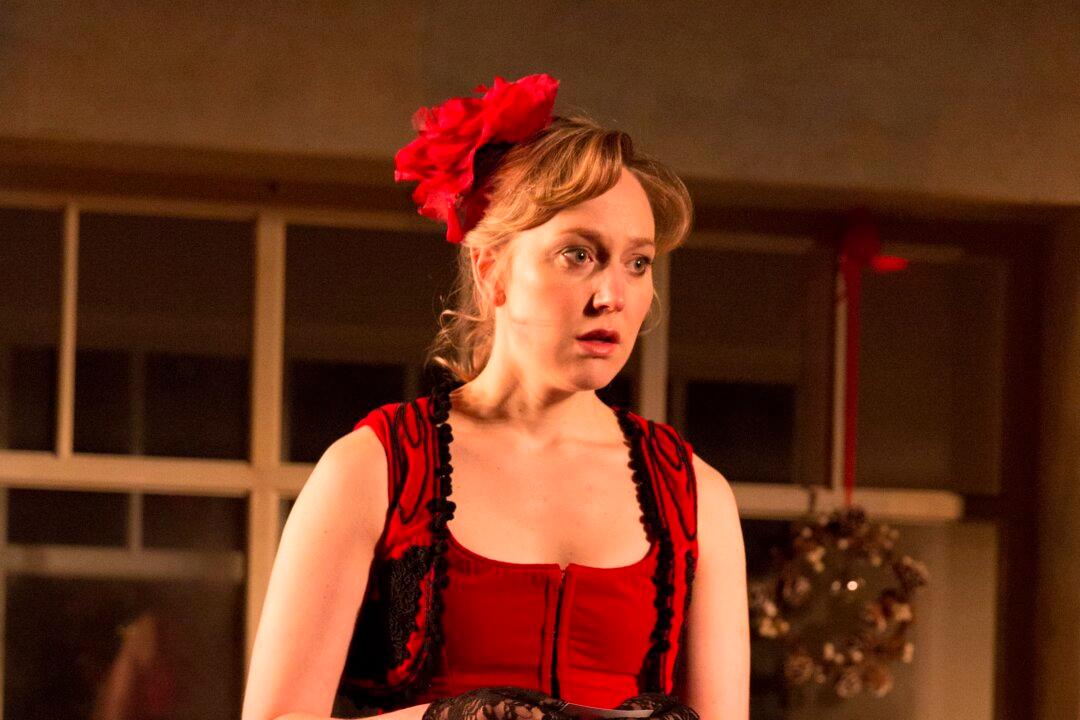BROOKLYN, N.Y.– London’s Young Vic production of Henrik Ibsen’s A Doll’s House, now transferred to Brooklyn Academy of Music (BAM), is not only entertaining, it is extraordinarily thought-provoking.
It has been directed brilliantly by Carrie Cracknell and has been rewritten and modernized by noted British playwright Simon Stephens. A potent element in the production is Ian MacNeil’s tantalizing set, which revolves at key moments to reveal various rooms in the Helmer family home with various characters holding brief, unheard conversations—very much like a camera panning.
The central performance of Nora Helmer, played by Hattie Morahan, is not just a breath of spring, it is a whirlwind of an interpretation. Instead of the passive victim often portrayed in other productions, here is a vibrant, sexy, manipulative woman using every ploy at her command to rise above the constraints imposed upon her by society and her demanding though caring (“in his fashion”) husband, Torvald (Dominic Rowan).
This Nora is not always a likeable person, but we can sympathize with her struggle to meet her hitherto unmet and not always understood needs. In sum, this version of A Doll’s House becomes almost a different play than the one we are used to.
It‘s Christmas time. Nora has brought home a number of gifts—they have two young boys and an infant—but Torvald gently chastises her for spending so much money. She reminds him that his important new job as head of the Savings Bank will give them plenty of money.
Kristine (Caroline Martin), a childhood friend of Nora’s, arrives. Her husband has recently died—an unhappy marriage—and Kristine now seeks work. Nora confides she secretly borrowed a large sum of money to pay for her and Torvald’s trip to Italy to repair Torvald’s recent illness.
The money lender, bank clerk Nils (Nick Fletcher), arrives and informs Nora that Torvald plans to fire him, and that he will expose Nora to Torvald for forging her father’s signature to obtain the loan.
Nils insists that Nora intercede for him to maintain his position at the bank. But Torvald refuses, given Nils’s poor moral character, and further states that he’s already given that job to Kristine.
Nils places an accusatory letter against Nora in Torvald’s locked post box. Nora tries to divert Torvald from opening it, entertaining him with a seductive rehearsal of a tarantella the couple plans to perform at a holiday party that evening.
When Torvald later opens Nils’s letter he rages against Nora, saying she has betrayed him. But moments later, when another letter arrives from Nils, releasing Nora from the debt, Torvald is all lovey-dovey.
Nora, for the first time realizing the hypocrisy of her whole life with Torvald, announces she has never been happy with him. She has been “cheerful.” Now she must leave him.
Thus, we hear “the slam that was heard round the world.” As, for the first time in known history, a wife has left a husband and children—with no apparent possibilities for her next step.
What of her future? She is a woman with no apparent skills. What of the husband and three children she has left behind?
Was Nora the first feminist? Some say yes. Others feel that the play continues to excite interest because it contains timely and universal resonances regarding men/women relationships, as the problems between the sexes have never been resolved. And there still remain differences of opinions as to the proper course marriage should take.
As for performances, I have already mentioned Hattie Morahan’s vivid portrayal, which won her the Evening Standard Theatre Award 2012 and Critics’ Circle Best Actress Award 2013.
Dominic Rowan’s Torvald skillfully melds his sexual attraction to Nora with his arrogance and habitual emotional abuse.
Nick Fletcher’s Nils presents a two-faced servile attitude mixed with the intensity of an opportunistic climber.
Others giving fine support include Caroline Martin, Steve Toussaint as Dr. Rank (a friend of the family), Mabel Clements and Leda Hodgson as servants, and Simon Desborough as a Delivery Man.
Children are played by Dilon Uruci, Jackson Demott Hill, and Yahn Galinovsky; infant, alternating Harriet Morrison-Sherrett, Luca Haywood, and Liam Lenert.
A Doll’s House
Brooklyn Academy of Music
BAM Harvey Theater
651 Fulton Street, Brooklyn
Running Time: 2 hours, 40 minutes
Tickets: 718-636-4100 or visit BAM.org
Closes: March 23
Diana Barth publishes New Millennium, an arts publication. For information: [email protected].





